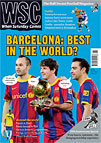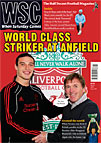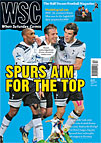 Mysterious foreign signings don’t always live up to heightened expectations. Andy Clark recalls how Dundee United fans found out the hard way
Mysterious foreign signings don’t always live up to heightened expectations. Andy Clark recalls how Dundee United fans found out the hard way
When Dundee United manager Jim McLean attempted to exploit the South American transfer market in 1991, his hope of bringing the next Gabriel Batistuta to the banks of the Tay didn’t quite work out as planned. In the early nineties, the formidable side United had become over the previous two decades began to falter. With an increased number of foreign players arriving in Scotland along with the recent Souness revolution at Rangers and growing pressure from fans for a big money signing, McLean decided to go international.
So it was in August 1991 that Dundee United announced the signing of ‘flying Argentinian winger’ Walter Rojas, a twenty-year old with dark flowing locks and “blistering pace”, from Buenos Aires club side San Lorenzo for a reported fee of £200k. United had apparently beaten off a host of clubs including Sampdoria and Foggia for the Argentine under-21 international signature. “El Explosivo“, as he had been nicknamed in his home country, was unveiled in a blaze of publicity. Fans were assured his debut would be imminent.
Then it all went very quiet. Weeks passed without any sign of the new long-haired wing wizard. According to the club, he had damaged a thigh muscle in training. However, rumours were circulating that Rojas might not be the player everyone thought he was. Opinion was rife in the city he was a “duffer”, apparently being taken to the cleaners by the reserve and youth team players in training. After almost three months, Rojas finally turned out for the reserves against Aberdeen in what proved to be his solitary appearance in a tangerine shirt and was well short of the standard required. One fan later claimed he had only two decent crosses in the game “when he blessed himself coming on and off the park”.
Then the conspiracy theories began. One source claimed United had been the victim of mistaken identity and had signed the wrong player. Another alleged that McLean had seen video footage of a prolific striker and was keen to sign him. A deal was negotiated but the player didn’t fancy the move so United were offered Rojas and took a chance.
Whatever the truth, United had been done. Rojas had only been a reserve team player at San Lorenzo and had played a mere four times for the first eleven in four years. Despite being inconspicuous by his absence on the park, there was no shortage of sightings of the player off it. ‘Rojas-spotting became a popular pastime with United fans in and around the city. “I used to see him in Buddies (a popular nightclub)” remembers one “he was strangely fond of having his jumper draped over his shoulders”. Another spotted him at a wedding in nearby Broughty Ferry.
I also had the thrill of encountering Rojas at the Megabowl Leisure Complex in Dundee. He looked slightly embarrassed and kept diverting my attention to the guy he was with. “Victor…this Victor,” he repeated in broken English. I thought nothing of it. He turned out to be Argentinian international Victor Ferreya, signed by United that day. Rojas clearly knew he was something of a fraud and had been embarrassed by all the attention whilst his new team-mate’s arrival appeared to have gone un-noticed. Rojas and Ferreya; were also invited to the Glenrothes Arabs player of the year dance. “They turned up in shell-suits, won nearly all the raffle prizes then swiftly fucked off back to Dundee,” recalled a witness.
Rojas returned to San Lorenzo then played for another three Argentine clubs before ending his career with Uruguayan side Huracan Buceo in 2000. Despite never playing a first team game, he achieved cult status among Arabs, as United fans are known. His moniker appears in a range of guises as usernames on messageboards and he has become a by-word for a duff foreign signing (and there have been plenty).
Twenty years on, McLean finally broke his silence on the bizarre episode. Rojas apparently only cost United an air fare and a few week’s expenses. There was no mistaken identity but having never seen him play, and to get around red tape, the player signed a contract and release form at the same time meaning United kept him if he was any good or could release him if he was a “dumpling”. The Explosive One proved to be a damp squib.
From WSC 295 September 2011


